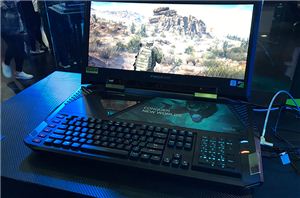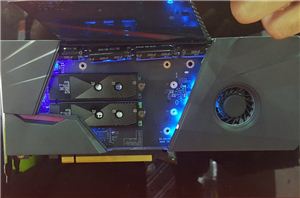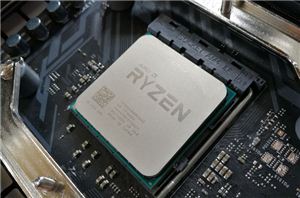Spotted at Computex: An M.4 SSD with a PCIe 3.0 x8 Interface
by Anton Shilov on June 14, 2019 4:00 PM EST
M.2 SSDs nowadays are used for a wide variety of applications, whereas Samsung tried to promote its next generation small form-factor (NGSFF) for enterprise-grade solid-state storage under the M.3 moniker (yet later renamed it to NF1). Apparently, there are companies that are working on SSDs in the so-called M.4 form-factor. One of such drives was spotted at Computex.
Silicon Motion demonstrated Agylstor’s M.4 NVMe SSD at the trade show earlier this month. The drive is based on SMI’s own enterprise-grade SM2270 controller based on three pairs of ARM Cortex R5 cores to support 2KB LDPC error correction and featuring 16 NAND channels with 8 CE per channel (128 CE in total) as well as a PCIe 3.0 x8 interface. Meanwhile, the SSD was assembled by SMART Modular.
Agylstor’s M.4 NVMe drive is essentially two M.2 SSDs (PCBs) glued together. The construction allows to install 16 NAND packages (eight on both sides) and thus offer an doubled capacity. Meanwhile, a PCIe 3.0 x8 interface promises a very strong performance. Keeping in mind that we are talking about an enterprise-grade controller and appropriate drives, we mean sustained performance, not peak performance.
Agylstor is a startup that develops specialized storage subsystems for a wide variety of applications from drones to video & film production as well as from IoT to oil & gas exploration. That said, Agylstor does not necessarily need to make SSDs compatible with general-purpose PCs for many reasons.
At present, it is unclear when Agylstor plans to release its M.4 NVMe SSDs.
Related Reading:
- Silicon Motion Announces SM2270 Enterprise NVMe SSD Controller
- Silicon Motion Roadmap: Lots Of NVMe SSD Controllers
- PCI-SIG Warns Of Incompatibilities Between M.2 And Samsung's NGSFF/NF1
| Want to keep up to date with all of our Computex 2019 Coverage? | ||||||
 Laptops |
 Hardware |
 Chips |
||||
| Follow AnandTech's breaking news here! | ||||||













34 Comments
View All Comments
TheUnhandledException - Friday, June 14, 2019 - link
The timing seems a bit weird with the move to PCIe 4.0 underway. 8 lanes of PCIe 3 = 4 lanes of PCIe 4.shabby - Friday, June 14, 2019 - link
Also It doesn't saturate pcie3.0 x4 either.jordanclock - Friday, June 14, 2019 - link
The article addresses that:"Keeping in mind that we are talking about an enterprise-grade controller and appropriate drives, we mean sustained performance, not peak performance."
So it likely can burst to much higher speeds at would exceed x4 links.
shabby - Saturday, June 15, 2019 - link
The spec sheet says around 3GB/sec so not sure what that quote is talking about when I read it.eek2121 - Sunday, June 16, 2019 - link
PCIE 3.0 x4 links. It still would not match PCIE 4.0 x4 links.HStewart - Friday, June 14, 2019 - link
Majority of computers will not have PCI-4 interface and likely even when PCI 5 is out. The majority of market it would probably laptops and I would be curious if TB 3.0 (IUSB4) would have interface to PCIe 3.0 x4 This would nice adapter out there..surt - Friday, June 14, 2019 - link
And what percentage of computers have a spare/usable x8 slot?Rocket321 - Saturday, June 15, 2019 - link
Quite a good percentage I would suspect. You can plug x8 cards into x16 physical slots and lots of boards come with more than one.Qasar - Saturday, June 15, 2019 - link
would these even fit in a pci e x8 slot ( or x16 slot for that matter ) the same ones that GPUs use ? looks like it is keyed wrong to fit in a standard pcie slot...Casper42 - Saturday, June 15, 2019 - link
Its an M.2 derivative, not a traditional PCIe slot.So this entire branch of comments is useless because NO ONE will have a M.4 slot on their laptop or desktop either.
You would need an adapter with either x8 PCIe to 1 of these, or maybe a x16 slot adapter that could take 2 of them.
Realistically, no clue who the market is for these.
Servers are moving more and more to U.2 (NVMe in a 2.5" drive on a modified SAS connector)
Plenty of space for NAND (not limited by 2280 specs) and as mentioned above, will support PCIe 4.0 in 2020 with the launch of new Rome boards and Cooper/Ice Lake on the Intel side.
Desktop platforms from Intel certainly don't have x8 laying around considering how few PCIe lanes even the latest 9900K has.